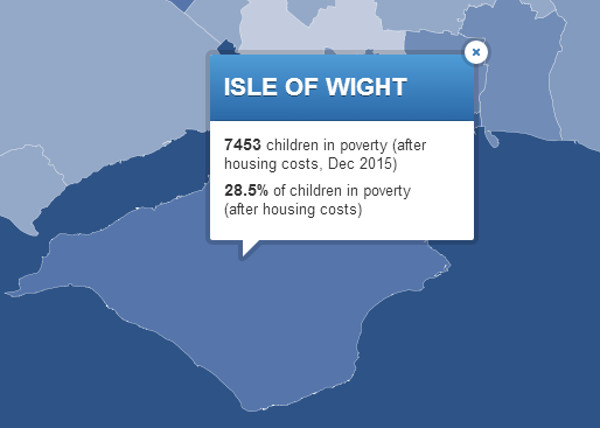A whopping 28.53% (7,453) of children on the Isle of Wight are living in poverty according to a new report published today (Tuesday).
The End Child Poverty coalition has published new figures providing a new Child Poverty map of the UK (see interactive map).
Lowest and highest on the Island
Cowes West and Gurnard has the lowest level of child poverty on the Isle of Wight with just 6.73%, whilst Ventnor West has the highest with 46.27%, followed closely by Newport East with 41.6%.
Nationally, there are more than 3.5 million children living in poverty and although the figures for the Isle of Wight sound high, child poverty is largest in cities such as London, Birmingham and Manchester.
Working families pushed below poverty line
The coalition of charities, faith groups and unions is warning that the benefits freeze in place until the end of the decade will mean that as prices rise, low income families will find it increasingly hard to pay for the same basic essentials.
They go on the say that recent cuts to in-work support under Universal Credit further penalise low income working families – pushing more working families below the poverty line.
End the freeze on children’s benefits
End Child Poverty is calling on the Government to use the upcoming Autumn Statement to end the freeze on children’s benefits, and to reverse the sharp cuts being introduced to in-work benefits under Universal Credit.
Chair of End Child Poverty Sam Royston said:
“As the Prime Minister has rightly recognised, this is not a country that works for everyone. In every community, there are children being denied the happy childhoods and the good start in life other children take for granted. Our children are now twice as likely to be poor as our pensioners.
“Many families who are just about managing today, won’t be managing tomorrow if Universal Credit leaves them with fewer pounds in their pocket, and if rising costs of living means their money doesn’t stretch as far as it used to.
“This month’s Autumn Statement is a major opportunity for the new government to act to help these families. We urge the Chancellor to reverse the significant cuts to Universal Credit targeted at working families and, at the very least, shield children’s benefits from inflation.”
Children in Need
Last week the NSPCC spoke out about their concerns in the four-year 105% rise in number of children in need in London and the South East.
Their research found that at the year end of March 2016, there were 1,302 children on the Isle of Wight considered ‘in need’.
A spokesperson for the NSPCC said:
“It’s deeply troubling that the number of children in need has risen.
“Abuse and neglect was identified as a factor in 553 children in need cases on the Isle of Wight.
“We know that nine in ten children who have been abused go on to suffer mental health problems before they reach the age of 18.
“Mental health problems can be devastating whether they affect the child in need, or their family members at home.
“The NSPCC’s It’s Time campaign has called on the Government to provide improved mental health support for children who have experienced abuse to help them understand and recover from their experiences.”
Read the report
The End Poverty report can be read in full. Click on the full screen icon to see larger version.
A breakdown of the Isle of Wight wards is also provided.





